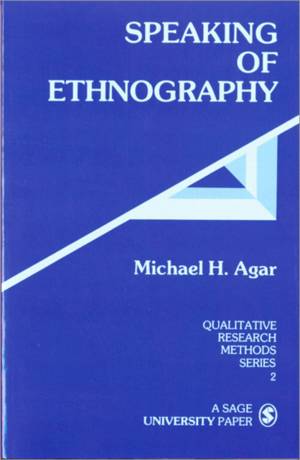
- Afhalen na 1 uur in een winkel met voorraad
- Gratis thuislevering in België vanaf € 30
- Ruim aanbod met 7 miljoen producten
- Afhalen na 1 uur in een winkel met voorraad
- Gratis thuislevering in België vanaf € 30
- Ruim aanbod met 7 miljoen producten
Zoeken
€ 70,45
+ 140 punten
Omschrijving
Challenging the assumed usefulness of conventional scientific procedures as the most appropriate models for the study of human affairs, author Michael Agar continues the premise set forth in his popular work, The Professional Stranger. Informed by a hermeneutic and phenomenological tradition, Agar′s fundamental thrust is that the social investigator′s practices and procedures are open to inspection and therefore subject to critical assessment. He places the researcher′s own taken-for-granted ways of acquiring knowledge at the center of the research process. The author discusses tradition and ethnography and looks at ethnographic understanding, specifically discussing coherence, breakdown, resolution, inference and schema, and scripts. He explores the ways borrowed ethnographic terms have been used in new contexts and examines ethnographic language and method. Presenting and comparing two examples of such language, he uses the life history of an addict and the world of independent trucking. The author′s lively and succinct style makes Speaking of Ethnography highly readable and enjoyable. Teachers, researchers, and students in the fields of sociology, anthropology, evaluation and research methods, education, psychology, management, and organization will find it a thought-provoking work.
Specificaties
Betrokkenen
- Auteur(s):
- Uitgeverij:
Inhoud
- Aantal bladzijden:
- 80
- Taal:
- Engels
- Reeks:
- Reeksnummer:
- nr. 2
Eigenschappen
- Productcode (EAN):
- 9780803924925
- Verschijningsdatum:
- 1/12/1985
- Uitvoering:
- Paperback
- Formaat:
- Trade paperback (VS)
- Afmetingen:
- 163 mm x 223 mm
- Gewicht:
- 99 g

Alleen bij Standaard Boekhandel
+ 140 punten op je klantenkaart van Standaard Boekhandel
Beoordelingen
We publiceren alleen reviews die voldoen aan de voorwaarden voor reviews. Bekijk onze voorwaarden voor reviews.











